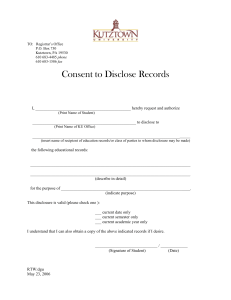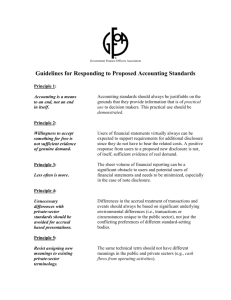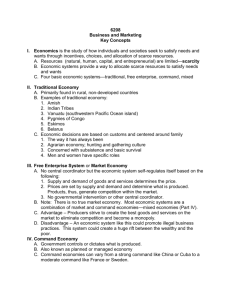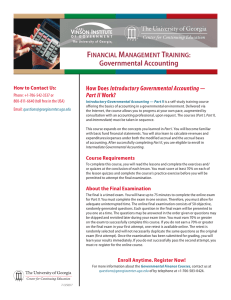F I B
advertisement
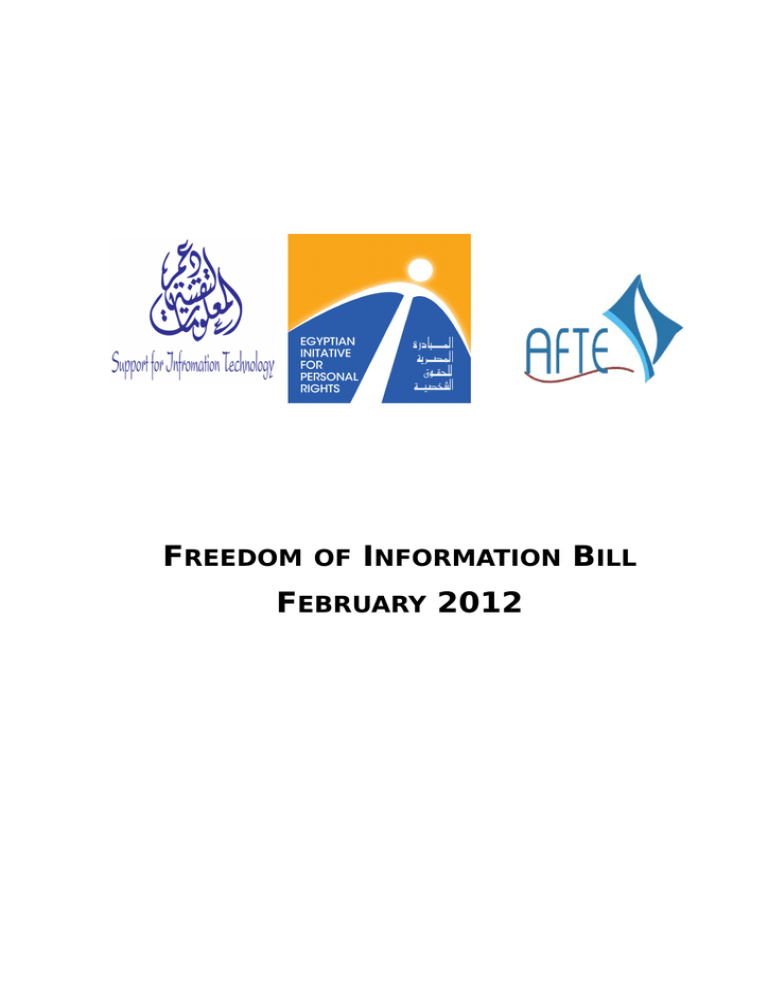
FREEDOM OF INFORMATION FEBRUARY 2012 BILL Introduction This is a decisive moment for Egypt, as the country prepares to write a new constitution enshrining rights and freedoms. This draft law strives to establish new legal grounds which would integrate amongst other rights the right to freedom of information, considered an inherent right, and which Egypt's successive constitutions have thus far failed to guarantee. The right to freedom of information is a central pillar in establishing the rule of law and forestalling corruption. The General Assembly of the United Nations stated as much in its first sitting: 'The freedom to access information is a basic human right and the cornerstone of all freedoms which the United Nations calls for.' This is the right which, today, has been established by Freedom of Information laws in more than 80 countries worldwide. A Freedom of Information Act is important for paving the way to the adoption of a number of new legal mechanisms and channels. These will be based on availability, disclosure, and transparency rather than obstacles, prevention, and restriction – like the laws regulating the telecommunications sector, data protection, documents and archives, and others. The existence of a Freedom of Information Act will overcome the arsenal of laws which are still used in the service of corruption and tyranny. The philosophy behind this law has several basic elements: initial unrestricted disclosure, apart from certain exceptions within the body of the law itself, and the responsibility of governmental and private bodies to routinely and periodically publish data, strengthening freedom of information and ushering these bodies to carry out their work according to new criteria based on weighing the public interest in disclosure against the benefit arising from confidentiality. Freedom of information is essential to improve the efficiency and performance of government agencies, just as it allows citizens to participate more effectively in dealing with government agencies, and regarding them as right holders. In addition, freedom of information is necessary for creating an environment favourable to investment, and ensuring that investors work in an culture of transparency, allowing them to take decisions based on real information. Freedom of information is sure to create and strengthen a climate of security for citizens and the government alike; and social justice cannot be guaranteed without equal access to information for all. This draft has benefited from the study of projects which appeared during the previous decade, through which the wider civil society and pioneers in this field within the body of government have contributed to this bill. This draft also comes as the fruit of over four months' collaboration between a number of civil society organizations, academics, and media figures, as well as the Cabinet's Information and DecisionMaking Support Centre. This working group sees the cooperation and discussion around this bill as no less important than the bill itself, setting out a new direction for lawmaking that we hope will be adopted to combine the efforts of government and civil society organizations in post-25th January Egypt. Support for Information Technology Egyptian Initiative for Personal Rights Association for Freedom of Thought and Expression Dr. Nagla Rizk, Director of the Centre for Access to Knowledge for Development at the American University of Cairo Dr. Khaled Fahmy, Professor of History at the American University of Cairo Lina Attallah, Editor-in-Chief, Egypt Independent Draft Bill No. XXX/2011 concerning freedom of information The President of the Republic, after perusing: The constitution; The Universal Declaration of Human Rights and the International Covenant on Civil and Political Rights; Law no. 189/1958 requiring that public entities, firms, companies and associations provide information about their employees; Law no. 35/1960 concerning statistics and census; Law no. 87/1960 concerning public mobilization and amended laws; Law no. 137/1963 concerning the enumeration of competencies, educational qualifications, and inventions; Law no. 121/1975 concerning the maintenance and security of official national documents and organizing the means of publishing them; Presidential Decree no. 2915/1964 concerning the construction and organisation of a central agency for public mobilization and statistics; Presidential Decree no. 627/1981 concerning the establishment of information and documentation centres within state administrative bodies, public bodies, and their various competencies; Has decided the following Chapter one : aims and definitions Article (1) In the context of the application of this bill, the terms below shall be defined as follows: a. Information: material which communicates something and which is recorded in any form, including in print, electronically, samples, models, audio or visual cassettes, or in any other form. b. Personal information: information relating to an individual by which that individual can be identified. c. Disclosure : a procedure by which information can be accessed using any means of communication, including direct access to the records containing this information, or a copy of those records, or via newspapers, radio, TV, or any other means. d. Record: any group of recorded information, regardless of its form, source, date of creation, or official status; regardless of whether the agency who keeps the record is the same one who created it; and regardless of whether it is classified as secret. e. Information officer: an individual appointed by a governmental or private body to publish and disclose information and to implement this decree. f. Governmental body: any body which represents the government and is established according to the constitution or the law; is a governmental department or forms a part of any level or branch of government; is owned, managed, or funded by funds managed by the state or the government; and performs a legal or public function, to the extent of that function. g. Private body: any non­governmental body working in the field of commerce and business, whose assets are privately owned, and which has a legal personality. h. National security : any information relating to the following shall be considered part of national security: 1­ Military plans and operations, and the state of readiness and operational capacity of military units, including identity, force, leadership structure, organisation of troops and units, and the equipment of any armed forces, as long as this information still has operational use. 2­ Weapons and their production, capabilities, and use, including technical specifications and inventions. 3­ Procedures for the protection of individuals, materials, systems, and facilities against an attack representing a danger to national security. 4­ Information falling into any of the aforementioned categories which has been presented by a foreign country or international body, who have asked explicitly and in writing that it be kept secret. 5­ Criminal investigations which relate to matters falling into any of the aforementioned categories. 6­ Secret intelligence service activities, sources or techniques which relate to matters falling into any of the aforementioned categories. Article (2) : the aims of this bill are as follows : 1­ Recognising the right to obtain information according to international standards and the principle that information should be made available in the absence of a reason to keep the information secret which would supersede this right. 2­ Putting in place procedures and mechanisms to promote the disclosure of information which would contribute to solving social and economical problems; fulfilling the requirements of planning and development; enhancing effective, open, and accountable government; and encouraging participation in governance. 3­ Achieving the goals of sub­articles (1) and (2), while maintaining security, safety, and overriding public and personal and rights, including personal privacy. Chapter two : right to access Article (3) : Each individual has the right to access information and records kept by governmental bodies, and those bodies must release such information and records subject to the provisions of this law. Article (4) : Each individual has the right to access information and records kept by private bodies when this information could facilitate the exercise or protection of any right, and those bodies have a corresponding responsibility to disclose information and records subject to the provisions of this act. Article (5) : 1­ All rights referred to in articles (3) and (4) shall be applied regardless of any other laws or acts or decrees which prevent or restrict the disclosure of information, or any system of administrative classification of records. 2­ No part of this law shall be understood as restricting or limiting the disclosure of information according to any other laws, policies, or practices. Article (6) : Any natural or legal person has the right to publish, via any means including the media, information that has been obtained according to this act. Article (6) (b) : All decrees preventing publication issued according to the Penal Code or the Criminal Procedure Code may be challenged before the administrative court. Chapter three: routine or suo moto publication Article (6) (c) : For the sake of governmental and private bodies' commitment to implementing the provisions of this act, such bodies will keep the information in their possession according to the provisions of the act regulating the National Archives and the regulations of other archives. Article (7) : 1­ Every governmental body subject to this act shall routinely publish: a. All details related to its organizational structure, responsibilities and duties, in addition to its policies and other basic organizational documents. b. All facts specifically relating to important decisions and policies which affect the public, no later than the time at which such decisions are made public. c. The procedure followed in decision­making processes, including channels of supervision and accountability. d. A guide including the names of all officials in the body, as well as their powers, duties, and salaries. e. The rules, systems, directives, and manuals that are used in the body or by employees to carry out their work. f. A description of the services which the body offers to the public and any government subsidy program, and a list of beneficiaries from these services or programs. g. Any opportunities or mechanisms for public consultation and any complaint mechanisms available to the public. h. Information about governmental programs and works including performance and quality indicators, procurements, the funding appropriated and the actual spending, and the results of public tenders. i. Declaration of the categories of information kept by bodies; this declaration must indicate records available electronically. j. Simple guidelines on how to submit an information request. k. Names, positions, contact details, and other details relating to information officials. l. Any other information as may be requested. 2­ The information required in sub­article (1) must be published on a large scale and in such a way to make it easy for the public to access it. This must happen regularly every month, with a maximum period of 3 months. 3­ Each governmental body shall present its reasons for taking administrative or quasi­judicial decisions to those affected by such decisions. 4­ Every governmental body shall seek to provide as much information as possible automatically, especially via the internet, taking into consideration capabilities and cost, in order to minimize the need for individuals to use the request procedure to obtain information. Chapter four : Procedures for requesting information Article (8) : Each governmental body shall establish an effective system specifically for receiving and processing requests for information, including the development of a simple form for requesting information. Article (9) : 1­ Each person has the right to present a written or oral request (including in electronic form) to any governmental or private body to obtain information or records held by this body. 2­ The information officer of a governmental body, appointed according to article (13) of this act, shall provide help and assistance to the requester where the request is not clear enough in specifying the requested information, or in case of illiteracy or disability, or any other reason. 3­ When the request is in oral form, the information officer shall convert it into written form and provide the individual with a copy of their request. 4­ When a request is submitted, no reasons or personal details need to be mentioned (except contact details) whereas requests submitted to private bodies should indicate the effect that obtaining the requested information or records will have in facilitating the exercise or protection of a right. 5­ A receipt must be given to the requester upon making a request. Article (10) : 1­ A governmental or private body shall respond to information requests pursuant to article (9) as fast as possible and in any case after a period of no longer than 15 days. 2­ When the request relates to information which seems important and necessary to protect an individual's life or liberty, a respond to the request must be within forty­eight hours. 3­ The response period may be extended to an additional fifteen working days, providing the requester is informed, when the request concerns a large number of documents or calls for searching through a large number of documents, or when consultation with third parties or other public agencies is necessary, so that a response in only fifteen days would be difficult. 4­ If there is no response to the request in the specified period, this may be considered a denial of the request. 5­ When a request for information is denied, the requester must be informed of the reasons for the denial, including the exceptions mentioned in this act on which the denial process is based, in addition to the name of the individual who took the decision of denying the request, and a clarification of the requester's right to appeal the denial of his request. 6­ When an information request is accepted, a notice shall be provided to the requester explaining the form in which the information shall be disclosed and the fees required; the disclosure of information or records shall then take place as soon as these fees are paid 7­ When partial access is granted, a notice shall be provided to the requester explaining the details of sub­article (6) with respect to the part of the request which is to be granted. This notice shall also explain the denial of access to part of the requested information, accompanied by the details mentioned in sub­article (5) related to this part of the request. Article (11): When the requester specifies a certain form in which the information shall be disclosed, this form mentioned in the request must be used, unless this form will harm the preservation of the record; in this case, the following options shall be presented to the requester: 1­ Possibility of examining the record and/or making a copy of it using their own equipment. 2­ Copying the original record in written form or in any other form. 3­ Written transcript of the content of audio records, audiovisual records, or records kept in any other non­written form. When a record is on the verge of becoming damaged, it should be copied digitally once so this copy can be used for the disclosure of the information it contains. Article (12) : 1­ Fees may be imposed for the disclosure of information pursuant to a request under article (9), provided that such fees do not exceed the actual cost of copying information and providing it to the requester. No fees will be imposed for viewing documents or records. 2­ No fees shall be imposed for requests to view personal information and information concerning the public interest, or when the socioeconomic level of the requester is below the poverty line, or when governmental agencies cannot respond to the request during the period mentioned in article (10). 3­ Implementation regulations shall determine the procedure for calculating and collecting the fees. 4­ Any requester who requires that information be disclosed in a form appropriate to his or her disability shall not pay a greater fee than a non­disabled requester obtaining the same information. Article (13) : Where the records containing the requested information are not held by a governmental body, the information officer shall within five days either transfer the request to another governmental body which holds this information or inform the requester that it does not hold the requested information. When a request is transferred to another body, the requester shall be notified. Chapter five : exceptions Article (14) : If the request for information relates to information falling under the exceptions specified in this chapter, the disclosure shall contain only the information that is not covered by these exceptions, provided this is applied in a reasonable way without prejudice to the contents of the record. Article (15) : 1­ Any governmental or private body may refuse to disclose information when this relates to unreasonable disclosure of personal information concerning a third party. 2­ Sub­article (1) shall not be used or applied in the following cases: a. The third party accepts the disclosure. b. The third party is informed of the intended disclosure according to article 18, and said third party does not object to the disclosure. c. The information was provided to the agency by the individual it concerns, and this individual was informed at the time that this information falls into the category of information which may be publicly disclosed. d. The information has already been publicly disclosed . e. The information is related to the welfare of a person in the care of the requester, and therefore disclosure of the information would be to the benefit of this person. f. Information relating to a person who works or has worked in a governmental body and relating to his or her activities as a governmental official. g. Information relating to a person who works or has worked in a governmental agency when this information is necessary to notify them of legal process taken against them. Article (16) : 1­ A governmental or private body may refuse to disclose information when to do so would breach a legal obligation towards a third party. 2­ A governmental or private body may refuse to disclose information that it has obtained from a third party in the case of a legal obligation between them or if it contains the following: a. Commercial secrets. b. Disclosure will represent real or potential damage to the financial or commercial interests of the third party. c. Disclosure would or would be likely to affect the provision of similar information in the future from a similar source, and the continued provision of this information is in the public interest. 3­ Sub–articles (1) and (2) shall not be applied where the third party has agreed to disclosure or if the third party has been informed of the disclosure according to article (18) and has accepted. 4­ A governmental or private body may refuse to disclose information that it has obtained in confidence from another state or international organization and disclosure would or would be likely to prejudice relations with this state or international organisation. Article (17) : A governmental or private body may refuse to disclose information resulting from legal procedures, unless the person who has the right to use this information has waived this right or if the information concerns the public interest. Article (18) : 1­ When a governmental body decides to disclose information obtained in confidence from a third party which said third party has classified as secret, the body should give the third party written notice of its intention to disclose this information, and give the third party eight days during which it may express its opposition to the disclosure in addition to giving reasons for not disclosing this information. 2­ If the third party opposes the disclosure of information according to sub­ article (1), the governmental body should take this into consideration, along with other points, when it is in the process of deciding whether to disclose the information or not. Article (19) : A governmental or private body may refuse to disclose information when disclosure would or would be likely to prejudice national security or defense, and the head of this body has issued a decree to the effect that the information contained in the record is confidential. This confidentiality shall expire after 30 years. Article (20): A governmental or private body may refuse to disclose information when disclosure would or would be likely to prejudice: 1­ The detection, prevention, or investigation of crime. 2­ The arrest or prosecution of offenders. Article (21) : A governmental or private body may refuse to disclose information when disclosure would or would be likely to prejudice the effectiveness or development of governmental policies while these policies are still being debated and researched. Article (24): A governmental body shall disclose requested information falling within the scope of the exceptions in this chapter when the benefit to public interest of disclosure would be greater than the harm that disclosure would cause to the interests protected by the exceptions. For the purposes of this article public interest shall include, for example – but is not limited to – threats to health, security, and environment, or exposing the risk of corruption or criminal acts, or mismanagement in the public sector. Chapter six : appeals Article (25) : 1­ A requester whose request to a governmental body has been denied has the right to appeal to the head of the relevant body within fifteen days from the date on which the request was denied. 2­ The head of the governmental body who receives the appeal pursuant to sub­article (1) must take a decision within ten days, and this decision shall be final. Article (26) : 1­ The president of the republic is responsible for appointing an Information Commissioner who has been chosen by a majority in the People's Assembly. 2­ An individual cannot be appointed to the position of Information Commissioner if he/she: a. Holds a position in a political party or works as an employee in a political party, or holds a public position by election or appointment in central or local government. b. Has been convicted of a crime involving moral turpitude. 3­ The Commissioner shall occupy this position for five years and may be appointed again with a maximum of two terms. 4 ­ The Commissioner shall enjoy practical and administrative independence from any other individual or entity including the government or any of its agencies. 5 ­ The Commissioner shall have all powers, direct and incidental, as are necessary to discharge his duties according to this act, including full legal personality and the power to acquire and dispose of property. 6 ­ The Commissioner shall receive the same salary as a judge of the Supreme Constitutional Court. 7 ­ The Commissioner shall present an annual report on his/her work to the People's Assembly; this report shall be released publicly, including on the website. 8 ­ The Commissioner shall present an annual budget proposal to the People's Assembly for approval by the assembly. Article (27) : 1­ An individual who has appealed to the head of a governmental body pursuant to article (25), or whose request has been denied by a private body, can appeal to the Information Commissioner within the fifteen days from the date of being informed of the decision. 2­ The Information Commissioner, in the process of examining an appeal pursuant to sub article (1), has the right to examine and study any records belonging to a governmental or private body and to ask any individual to provide evidence relating to the issue. 3­ In examining appeals pursuant to sub­article (1), the Information Commissioner shall grant the requester and the governmental or private body a favourable opportunity to choose who will represent them. 4­ The Information Commissioner shall rule on the appeal pursuant to sub­ article (1) within ten days, and he/she also has the authority to deny the appeal, approve the disclosure of the information, alter the fees charged, and/or compel the agency to take other procedures in order for them to comply with this. 5­ The Information Commissioner's decision pursuant to sub­ article (4) and subject to the provisions of this law shall be legally binding. Article (28) : 1­ A requester whose appeal has been denied by the Information Commissioner according to article (27) has the right to appeal via normal procedures to the administrative court within fifteen days beginning from the day of being informed of the appeal's denial. 2­ The judge must issue a timely ruling approving, amending, or canceling the decision. Chapter seven : promotion procedures Article (29) : 1­ A Supreme Information Council shall be established with public legal personality. 2­ Members of the council will include representatives of entities involved and working in the area of information, including the Ministry of Planning, Ministry of Finance, Ministry of Communications and Information Technology, the Central Agency for Public Mobilization and Statistics, the Central Agency for Accounting, the Information and Decision Support Centre, the Director of the National Library and National Archives, and five representatives of non­governmental bodies and specialized experts. 3­ The Prime Minister shall appoint the members of the council after the approval of the People's Assembly. In the absence of the People's Assembly, the appointments shall take place, but the appointment decrees should be brought to the attention of the People's Assembly in its first session. 4­ The council is responsible for setting its own procedural regulations. 5­ The council shall discharge the following functions: a. Putting in place public policies relating to disclosure and circulation of information. b. Putting in place regulations for classifying records. c. Setting minimum standards for keeping, managing, and disposing of records, in the form of a binding charter. Article (30) : 1­ Each governmental body shall present a report to the minister responsible for it, no later than the 31 st August each year, concerning its activities implementing the provisions of this law. 2­ The report referred to in sub­article (1) shall include the following : a. Procedures taken to implement article 7(4) relating to routine disclosure. b. Number of information requests submitted. c. Number of requests completely approved. d. Number of requests denied, either completely or partially. e. Number of internal appeals made to the head of the relevant governmental body and the number of requests approved as a result of these appeals. f. Numbers of appeals to the information commissioner and the resulting rulings. g. Number of appeals to the courts and the resulting rulings. h. Such other other matters as may be prescribed by law. 3­ The minister mentioned in sub­article (1) shall present this report to the Prime Minister and the Information Commissioner in addition to releasing it publicly, including on the internet. Article (31): 1­ Each governmental body shall appoint an information official to carry out the responsibility of making the agency comply with this act. 2­ All officials and employees of governmental agencies should cooperate with the information official to help him carry out his work and duties. Article (32) : In addition to the powers and responsibilities mentioned in this act, the Information Commissioner shall, through his or her resources, do the following : 1­ Monitor the extent to which governmental bodies comply with this act and present reports relating to this to the People's Assembly. 2­ Make recommendations to reform governmental bodies either in general or by specifying agencies for reform. 3­ Cooperate in presenting and holding training activities for government officials on the right to access information and the successful implementation of this act. 4­ Work to spread public awareness of this act and individuals' rights pursuant to it. 5­ Prepare an annual report on the application of this act, to be presented no later than the 30 th September each year, based on part of the reports mentioned in article (30). These reports shall be presented to the People's Assembly and distributed publicly including on the commissioner’s website. 6­ Prepare guidelines for the public including their rights granted by this act and how to exercise them, and make such guidelines widely available. 7­ Carry out any other procedures as may be necessary for the implementation of this act. Chapter eight: crimes and protection Article (33) : Anyone who commits the following crimes shall be punished by a fine no less than 5000 LE and no more than 20000 LE: 1­ Obstructing the disclosure of information in contravention of the provisions of this act. 2­ Obstructing a governmental or private body from carrying out its obligations according to this act. 3­ Interfering in the work of the Information Commissioner. Article ( 33) (b) Anyone who damages, destroys, or steals records shall be punished by 3 years' imprisonment. Article (34) : No individual shall be subject to civil or criminal proceedings, or employment detriment, for anything done in good faith during the practice, performance, or execution of any of the powers or duties with regards to this act. Article (35) : 1­ No individual shall be subject to legal, administrative, or employment­related punishments, regardless of the contravention of legal or professional duties, for disclosing information about wrongdoing or which reveals threats to health or security, as long as the individual acted in good faith and belief in the complete validity of the information. 2­ The word 'wrongdoing' in the context of sub­article (1) means committing criminal acts, not complying with legal obligations, miscarriage of justice, corruption or dishonesty, abuse of power or serious misconduct, in addition to threatening public health, safety, or the environment, whether this is linked to the mistake made or not. Chapter nine : final provisions Article (36) : The provisions of the attached act concerning access to information shall be binding for all bodies falling within its ambit. Article (36) (b): The president of the republic or his representative shall appoint the first Information Commissioner. Article (37) : The Supreme Information Council shall be responsible for applying this law, and it shall issue the implementation regulations within 90 days from the date it comes into effect. Article (38) : This law shall be published in the official gazette and shall come into effect 30 days after such publication. 90 days will be accorded to apply articles 7,8,26,29,31, and 36(b).
